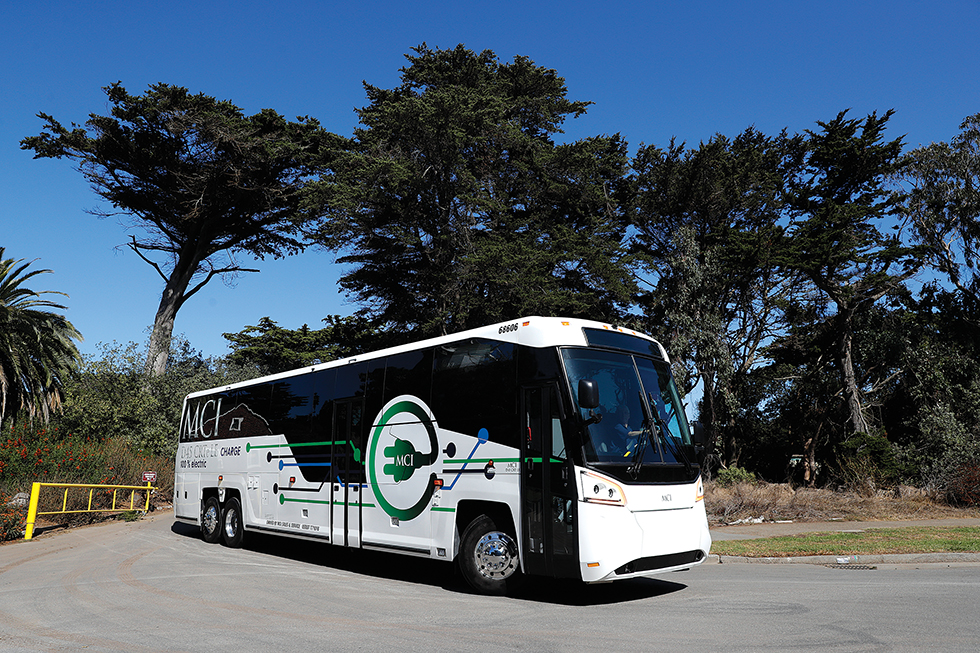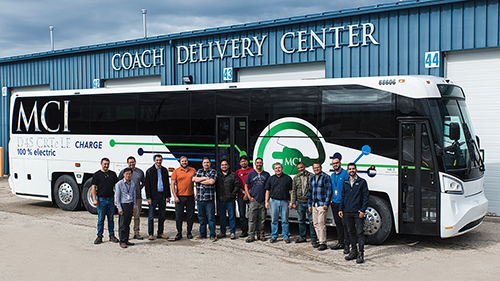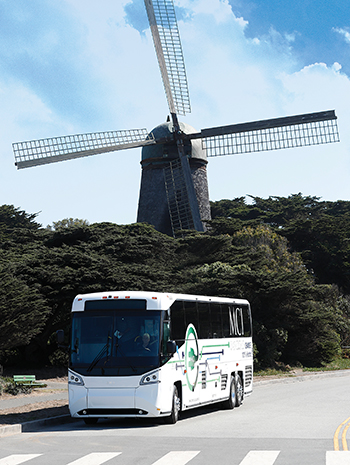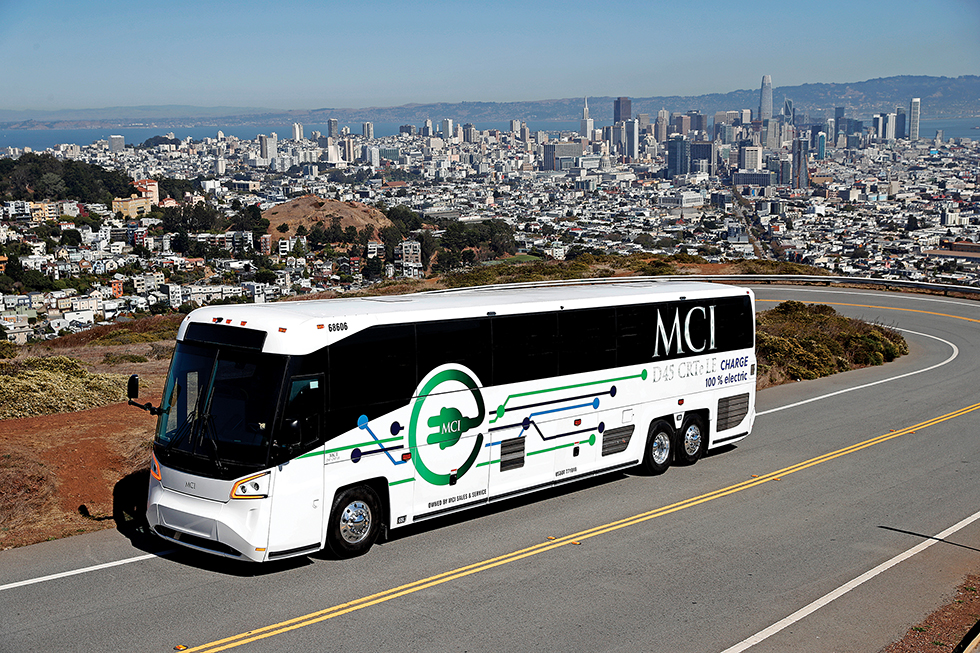
With the impending 2020 launches of its all-electric models — the MCI J4500e CHARGE and MCI D45 CRTe LE CHARGE — Motor Coach Industries (MCI) is poised to extend its proven knowledge and expertise into the zero-emissions vehicle market.
Working with the extensive proven in-field performance of the all-electric New Flyer CHARGE products, MCI’s CHARGE initiative aims to approach electric coaches from a holistic perspective. Recognizing that that all-electric vehicles represent significant investments for businesses and agencies, MCI intends to work with its customers to also evaluate their operational needs and infrastructure requirements.
Brent Maitland, vice president of marketing and product planning at MCI, said the push toward electric motorcoaches was born from customer input combined with MCI’s strength as a member of the NFI Group.
“Customers were telling us, ‘You’ve got to be able to get over 200 miles a day with an electric bus, which will essentially get us through an entire operating day in their specific commuter application,’” he said. “That became the clear benchmark for our development team .”

Research and development
According to David Warren, director of sustainable transportation at New Flyer, achieving a range of “over 200 miles” is more complicated than it initially sounds. In short, an all-electric vehicle’s range is predicated on numerous factors including application, componentry, accessories, and weather. Changing any one of these factors affects the true range of a bus, Warren said, so MCI and New Flyer spent a lot of time and effort developing a battery which would perform reliably across multiple applications with appropriate infrastructure requirements.
Maitland said that it was critical the all-electric lineup perform similarly to the company’s proven diesel lineup.
“MCI has established standards for vehicle performance,” he said. “We have to bring out an electric product that meets our customers’ expectations for reliability and durability.”
As such, Maitland said, vehicle testing has been extensive, and MCI is confident that its range and charge projections are accurate, although range will be specific to each customer’s expectation.
“Anybody can talk about a theoretical range of 500 miles that our customers will never see,” he said. “We could do that also, but then we’d set an unrealistic expectations of real-world performance. Our coach needs to deliver the miles in the planned application for many years. It is that performance that earns customer trust.”
 The company designed the MCI J4500e CHARGE and MCI D45 CRTe LE CHARGE to feature common electric architecture. Both buses include a high-torque, 350-horsepower Siemens 3320 LB FT electric drive system designed to handle long distance applications and highway speeds, and nickel manganese cobalt (NMC) batteries charge by the current latest 150 kWh depot charger with a common CCS 1 plug.
The company designed the MCI J4500e CHARGE and MCI D45 CRTe LE CHARGE to feature common electric architecture. Both buses include a high-torque, 350-horsepower Siemens 3320 LB FT electric drive system designed to handle long distance applications and highway speeds, and nickel manganese cobalt (NMC) batteries charge by the current latest 150 kWh depot charger with a common CCS 1 plug.
The NMC batteries allow for a full charge in less than four hours after plug-in for MCI’s544 kWH battery configurations and faster for lower setups.
Brad Lamothe, senior technical advisor at MCI, said the company focused heavily on the drive system’s performance, so that it is similar to the responsiveness of a clean diesel engine. He added that the vehicle’s regenerative braking uses kinetic energy to recharge the vehicle battery, which works well in stop-start applications.
“The Siemens system has massive torque, allowing the vehicle to easily climb hills,” he said. “At average road speeds and conditions its range can exceed 200 miles and in some ideal, but real-world test routes we’ve seen over 350 miles predicted range.”
MCI D45 CRTe LE
The first of MCI’s lineup to go all-electric, the MCI D45 CRTe LE’s diesel counterpart was introduced in 2017 as part of the company’s foray into accessibility-focused transportation.
“The D45 CRT LE was a significant project for MCI,” Maitland said. “We took several years to research the best possible solution to improve accessibility to the coach. We were able to get real feedback from people with disabilities and other users and incorporated their suggestions into the patented vestibule design, which major advocacy group such as AAPD (American Association of People with Disabilities) and NCIL (National Council on Independent Living) have evaluated and approved. ”
The commuter coach is notable for its low-floor design, for quickly and efficiently loading and unloading passengers with disabilities. The vehicle’s boarding time is comparable to a low-floor transit vehicle and features a mid-coach low-entry vestibule (and automated ramp) with seating optimized for fast boarding and wheelchairs.

The vestibule allows for numerous seating configurations for users of mobility devices, and just as importantly their companion or attendant: five seats in the lower vestibule; a single forward-facing position; rearward facing with QUANTUM by Q’Straint; a rearward and forward position; or two forward positions.
MCI offers the manual Q-Straint wheelchair securement system as standard, and the automated QUANTUM as an option for the rear facing position on the right of the vestibule.
The coach allows for 54 passengers, or 52 passengers with two mobility devices.
Maitland said that the coach is proving popular in transit agency operation -settings, and MCI has begun seeing more demand in both the private and public sector for the low-entry commuter coach.
“At the same time, we are getting significant requests from places like California for electrification,” he said. “The loudest are Bay Area tech companies which can use these coaches for employee transportation programs where both 100% battery electric and improved accessibility are important.”
This confluence of technological capabilities and consumer demand made the D45 CRTe LE prime for electrification. The D45 CRTe LE all electric model is also equipped with MCI Connect Telematics, a system that measures key performance metrics including distance and time on route, auxiliary systems, along with battery efficiencies related to grade and ambient temperature in real time.
MCI J4500e
The J4500 is MCI’s long-time best-selling tour and charter coach, and the electrified J4500e promises to be the company’s longest-range electric vehicle.
“The J4500’s high-floor design allows for more battery packs, making it the longest-range vehicle in our fleet,” Maitland said. “A lot of range is dictated by a vehicle’s architecture, and the J4500e will be a electric workhorse like its diesel-powered predecessors.”
Just like its diesel counterpart, the J4500e features seating for up to 60 passengers with best-in-class legroom and usable floor space. Featuring at least 15 inches more usable floor space than its closest competitors, the J4500e’s passenger cabin’s sleek design is inspired by the airline industry.
The driver’s area features increased legroom, a toe kick, improved visibility over the dash and a new, integrated high-definition instrument panel with on-screen information and key system diagnostics for the driver. The vehicle’s signature spiral stairway features improved visibility and RGB lamps that coordinate with cabin lighting.
BMW Group’s Designworks were design partners for both the exterior and interior of the J4500e and the D45 CRTe LE and their work ensures a high level of appeal, especially when equipped with extensive seating and trim choices, parcel racks, spacious interiors for enhanced passenger comfort, and Wi-Fi connectivity with power outlets at every seat.
Getting onboard with all-electric
The MCI CHARGE vehicles are easily reaching and sustaining highway speeds up to 72 mph and reliability targets in initial prototype test runs, Lamothe said.
After the J4500e and D45 CRTe LE hit the road, Maitland said the company will begin introducing other electrified models including D45 CRT, our next generation high floor commuter coach that is planned to have the same long range capability as the J4500, and based on demand and applications other variants such as the next generation D4520, the J3500,By 2020 we will have 2 electric models in market and up to 6 total 100% electric variants across the D and J models over the new few years.
MCI CHARGE vehicles are backed by MCI’s sales, 24/7 service, parts and technical training infrastructure — including 24/7 roadside assistance, ongoing technical training from the industry’s only ASE-accredited MCI Academy training center, and parts support from NFI Parts.
Maitland said that MCI will be installing a 150-kilowatt charging station by ABB at its Hayward, California, facility.
“That charging station will be the base for continued vehicle testing, as well as customer demonstrations which are in process and will continue through 2020,” he said.
Reliable innovation
Research and development is ongoing for MCI. Anniston, Alambama is home to the Vehicle Innovation Center (VIC), a joint partnership with New Flyer of America and MCI where electric and advanced driver assistance systems technology are on display and showcased. The VIC also serves as a primary training facility for both MCI and New Flyer electric vehicles
“The J4500e, our private sector luxury tour coach and D45 CRTe LE, designed to meet the needs of our public transit agencies, provide two electric coach alternatives,” Maitland said. “MCI is prepared to show all of our customers – both in public transit and private transportation — a viable path toward zero emissions.”
